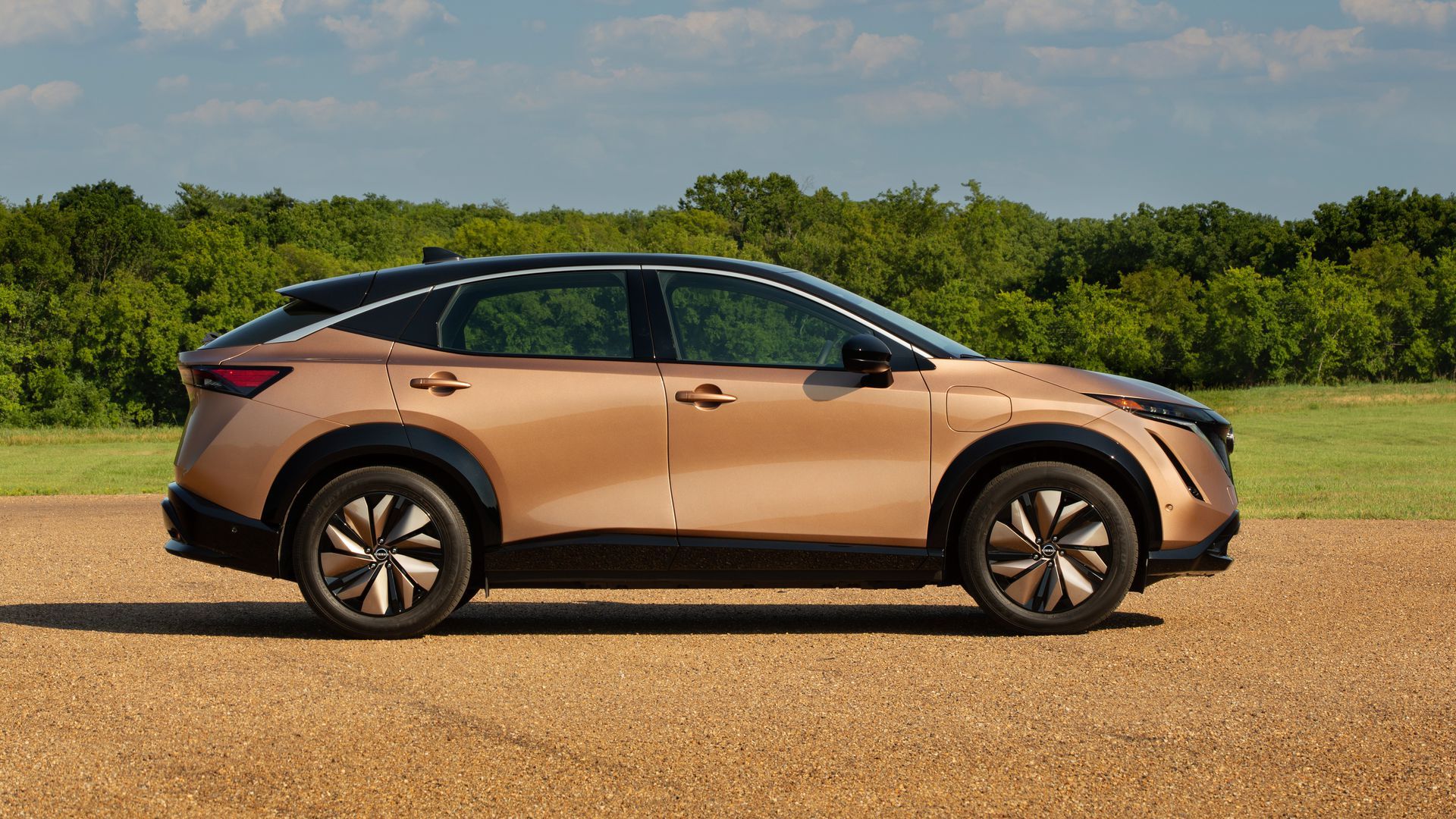| | | | | | | Presented By Environmental Defense Fund | | | | Axios What's Next | | By Joann Muller, Jennifer A. Kingson and Alex Fitzpatrick · Nov 30, 2022 | | Alex here. I have a big soft spot for the Nissan Leaf — it was the first electric car I drove and felt so obviously like the future. Now, as Joann reports, the Japanese automaker is planning a major EV revival after blowing its lead to Tesla. - What was the first EV you rode in or drove? Share your story with us: whatsnext@axios.com.
- Join Axios tomorrow at 12:30 p.m. ET for a virtual event on global food security, sustainability and climate change. Register here to attend.
Today's newsletter is 1,102 words ... 4 minutes. | | | | | | 1 big thing: Nissan wants to be EV king again |  | | | The 2023 Nissan Ariya arrives in dealer showrooms in December. Photo courtesy of Nissan | | | | Nissan, whose entry-level Leaf dominated the U.S. electric vehicle (EV) landscape in the early 2010s before Tesla took a commanding lead, is aiming to claw back market share with a bevy of new, relatively affordable models, Joann Muller reports. - Its planned renaissance starts with the Ariya crossover utility, on sale in December at a starting price of $43,190.
- Later this decade, Nissan plans to introduce a proprietary low-cost, solid-state battery that it says will help make EVs affordable for everyone.
Why it matters: CEO Makoto Uchida is desperate to revive the Japanese carmaker after four years of turmoil triggered by the 2018 arrest of former CEO Carlos Ghosn in Japan, for alleged financial crimes, and his subsequent escape to Lebanon. - Uchida's mission is enormous: He's attempting to repair the carmaker's finances, revive Nissan's brand and rebuild a demoralized corporate culture.
- His hopes hinge on "Nissan Ambition 2030," a long-term strategy built around electrification and technological innovation.
 Data: S&P Global Mobility; Note: GEM models not included; Chart: Simran Parwani/Axios Details: Over the next decade, Nissan's goal is to introduce 23 electrified models for its namesake and Infiniti brands globally, including 15 all-electric vehicles. - Nissan expects 40% of its U.S. sales to be fully electric by 2030.
- "Two years ago, I was not sure the U.S. would go to the EV era," Uchida told Axios. "Now it's more obvious."
- The carmaker is investing more than $14 billion in the effort over the next four years, including an expansion of battery production in Tennessee.
The intrigue: Nissan is also developing a new solid-state battery that would be a breakthrough for the EV movement. - Solid-state batteries can store twice as much energy as conventional EV batteries — potentially doubling a car's driving range — and can charge in one-third the time.
- They're also safer and cheaper.
Where it stands: Researchers have been working on solid-state batteries for years, but have struggled to commercialize the technology. - Nissan aims to start pilot production in Japan in 2024 and to sell EVs equipped with its in-house battery in 2028.
Yes, but: Tesla long ago lapped Nissan with EVs that offer triple the driving range of the original Leaf — plus high-tech, consumer-friendly features that improve over time via software updates. - A 2021 Cox Automotive study found 83% of potential EV buyers were aware that Tesla sells EVs, but only 37% knew of Nissan's offering — even though the Leaf had been sold in the U.S. for more than a decade.
- Today the Leaf accounts for less than 2% of the EV market, down from 70% in 2012.
What to watch: New models from multiple carmakers are starting to chip away at Tesla's dominant share of the U.S. EV market, which stands at 65%. What's next: It's not easy to rebuild a brand, especially if you're taking on one as strong as Tesla — but dramatically higher-range EVs at a price people can afford could eventually give Nissan a boost, if its solid-state battery efforts bear fruit. Share this story. |     | | | | | | 2. Fighting China's digital censors |  | | | A resident holds a sign in protest of COVID-19 restrictions on Nov. 28 in Hong Kong. Photo: Anthony Kwan/Getty Images | | | | Chinese internet users are racing to screenshot and repost content related to COVID-19 lockdown protests across the country as government censors try to scrub dissent from social media, Axios' Bethany Allen-Ebrahimian reports. Why it matters: Videos and photos posted online are one of the only ways to get information about the protests, since information is tightly controlled in China and journalism in the country is heavily restricted. Driving the news: Protests have been spreading across China in response to pandemic policies that have seen people locked in their apartments for weeks or even months at a time and made daily life uncertain for hundreds of millions of people. What's happening: One former Shanghai resident surnamed Wang told Axios she has been staying up late grabbing screenshots of articles and social media posts about the protests, posting them on WeChat, and sending them to friends so the posts can still be viewed in China. - "None of this is organized. There's no group chat of us saying we should screenshot this before it's deleted," said Wang, who moved to Taipei a few months ago and asked us to withhold her full name to protect family and friends in China.
- Over the weekend, countless Chinese social media users posted and reposted messages intended to convey dissent but circumvent censors.
What we're watching: Chinese authorities relaxed some pandemic restrictions this week, but show no signs of completely abandoning their strict "zero COVID" policy. Read the rest. |     | | | | | | 3. 3D-printed Moon buildings |  | | | Astronauts outside their lunar home. Rendering courtesy of ICON | | | | ICON, a cutting-edge construction firm specializing in 3D-printed buildings, has landed a nearly $60 million NASA contract to develop space-based construction methods, Axios Austin's Asher Price reports. Why it matters: NASA aims to one day have astronauts living on the Moon (and eventually Mars), and they'll need someplace to call home. What they're saying: "We feel real weight and responsibility — we're not just doing this for ourselves, we're giving humanity the capability to build on other worlds," ICON CEO Jason Ballard told Axios. - "The final deliverable of this contract will be humanity's first construction on another world, and that is going to be a pretty special achievement."
What's next: Ballard said NASA could use ICON's tech on the Moon as soon as 2026. Yes, but: NASA's new Moon program has only just begun, and critical equipment — like a new lunar lander — remains under development. Read the rest. |     | | | | | | A message from Environmental Defense Fund | | What's ahead for the climate | | |  | | | | The biggest climate law in U.S. history passed. The Inflation Reduction Act of 2022 includes $369 billion in funding to fight climate change — but there's more work to be done. Looking ahead: See how we're helping ensure these climate investments deliver results for everyone. Learn more. | | | | | | 4. 📊Companies go solar |  Data: Solar Energy Industries Association; Chart: Axios Visuals Corporate solar installations and procurement account for 14% of current U.S. capacity, per new data from the Solar Energy Industries Association, Axios' Ben Geman reports. Why it matters: Tech giants, retailers and other companies are important drivers of renewables adoption, given their high energy consumption. Details: Facebook parent Meta accounts for the largest share of corporate solar use, with nearly 3,600 megawatts of total capacity across all installations. - By comparison, the single largest U.S. solar facility — California's Solar Star farm — generates nearly 600 megawatts.
|     | | | | | | 5. The right to be "no fun" |  | | | Illustration: Gabriella Turrisi/Axios | | | | French workers can't be fired for being "no fun," a local court recently ruled, Axios' Emily Peck reports. Details: The case dates back to 2015, when a consultant for Cubik Partners in Paris was dismissed in part for refusing to adhere to the company's "fun and pro" values. - The firm's social events involved excessive alcohol consumption and "practices prone to promiscuity," according to the decision.
What to know: In the U.S., you could theoretically be fired for being "no fun." - "There's no freedom of expression in the American workplace," said Susan Crumiller, whose New York-based law firm handles workplace discrimination cases.
Yes, but: Situations like that of the French case could "constitute a gender-discriminatory hostile work environment," Crumiller said — in which case, companies couldn't fire you for being "no fun." Share this story. |     | | | | | | A message from Environmental Defense Fund | | A climate victory for all | | |  | | | | The biggest climate law in U.S. history passed, but there's more work to be done. Next steps: Discover what the new law will mean for everyone and see how EDF will ensure these climate investments deliver results. Learn more about the impact. | | | | Big thanks to What's Next copy editor Amy Stern. Was this email forwarded to you? Get your daily dose of What's Next by signing up here for our free newsletter. |  | | Are you a fan of this email format? Your essential communications — to staff, clients and other stakeholders — can have the same style. Axios HQ, a powerful platform, will help you do it. | | | | | | Axios thanks our partners for supporting our newsletters. If you're interested in advertising, learn more here.
Sponsorship has no influence on editorial content. Axios, 3100 Clarendon Blvd, Arlington VA 22201 | | | You received this email because you signed up for newsletters from Axios.
Change your preferences or unsubscribe here. | | | Was this email forwarded to you?
Sign up now to get Axios in your inbox. | | | | Follow Axios on social media:    | | | | | |











No comments:
Post a Comment